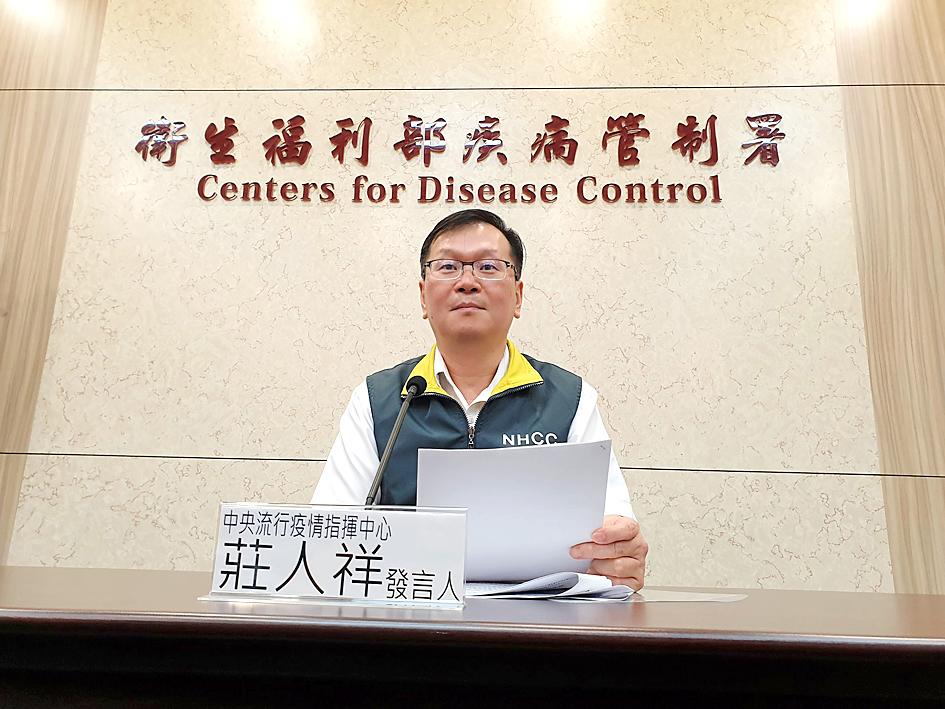The Central Epidemic Command Center (CECC) yesterday reported two new imported cases of COVID-19, increasing the number of confirmed cases in the nation to 445.
They are a married couple who worked in Bangladesh and returned home via Malaysia on Saturday, and were the first new imported cases since June 1, it said.
Centers for Disease Control (CDC) Deputy Director-General Chuang Jen-hsiang (莊人祥), the CECC spokesman, said that the man is in his 50s and the woman is in her 40s, and they went to Bangladesh in late January and early March respectively.

Photo: CNA
The man on May 23 developed a fever, coughing, a sore throat, muscle pain and an abnormal sense of smell, while the woman developed a fever two days later, Chuang said.
They were diagnosed with COVID-19 and hospitalized in Bangladesh on May 25 and May 28 respectively, he said.
The man’s symptoms had alleviated by May 26 and he tested negative twice for the novel coronavirus on May 28 and June 2, he added.
The woman tested negative only once, on June 2, but the hospital said it had too many patients and allowed her to leave, Chuang said.
They were discharged from the hospital on June 2 and remained at home in Bangladesh until Friday, when they left for Taiwan, he said.
They wore masks and protective clothing during their flights, and did not come into close contact with friends or family after they returned, he said.
“They did not show any symptoms upon their arrival in Taiwan, but they told airport quarantine officers that they had been hospitalized for COVID-19 in Bangladesh, so they were tested at the airport and taken to a centralized quarantine facility for isolation,” he said.
The couple tested positive for the novel coronavirus and were hospitalized yesterday, he said.
The 11 crew members on the flight to Taiwan also wore masks and protective clothing, so they were asked to perform self-health management, while 26 passengers who sat in the same row and the two rows in the front and back of the couple have been placed under home quarantine, Chuang said.
As of yesterday, the nation had maintained a zero rate of local transmission for 64 days, the CECC said.
Additional reporting by CNA

The Central Election Commission has amended election and recall regulations to require elected office candidates to provide proof that they have no Chinese citizenship, a Cabinet report said. The commission on Oct. 29 last year revised the Measures for the Permission of Family-based Residence, Long-term Residence and Settlement of People from the Mainland Area in the Taiwan Area (大陸地區人民在台灣地區依親居留長期居留或定居許可辦法), the Executive Yuan said in a report it submitted to the legislature for review. The revision requires Chinese citizens applying for permanent residency to submit notarial documents showing that they have lost their Chinese household record and have renounced — or have never

A magnitude 5.6 earthquake struck off the coast of Yilan County at 12:37pm today, with clear shaking felt across much of northern Taiwan. There were no immediate reports of damage. The epicenter of the quake was 16.9km east-southeast of Yilan County Hall offshore at a depth of 66.8km, Central Weather Administration (CWA) data showed. The maximum intensity registered at a 4 in Yilan County’s Nanao Township (南澳) on Taiwan’s seven-tier scale. Other parts of Yilan, as well as certain areas of Hualien County, Taipei, New Taipei City, Taoyuan, Hsinchu County, Taichung and Miaoli County, recorded intensities of 3. Residents of Yilan County and Taipei received

Taiwan has secured another breakthrough in fruit exports, with jujubes, dragon fruit and lychees approved for shipment to the EU, the Ministry of Agriculture said yesterday. The Animal and Plant Health Inspection Agency on Thursday received formal notification of the approval from the EU, the ministry said, adding that the decision was expected to expand Taiwanese fruit producers’ access to high-end European markets. Taiwan exported 126 tonnes of lychees last year, valued at US$1.48 million, with Japan accounting for 102 tonnes. Other export destinations included New Zealand, Hong Kong, the US and Australia, ministry data showed. Jujube exports totaled 103 tonnes, valued at

BIG SPENDERS: Foreign investors bought the most Taiwan equities since 2005, signaling confidence that an AI boom would continue to benefit chipmakers Taiwan Semiconductor Manufacturing Co’s (TSMC, 台積電) market capitalization swelled to US$2 trillion for the first time following a 4.25 percent rally in its American depositary receipts (ADR) overnight, putting the world’s biggest contract chipmaker sixth on the list of the world’s biggest companies by market capitalization, just behind Amazon.com Inc. The site CompaniesMarketcap.com ranked TSMC ahead of Saudi Aramco and Meta Platforms Inc. The Taiwanese company’s ADRs on Tuesday surged to US$385.75 on the New York Stock Exchange, as strong demand for artificial intelligence (AI) applications led to chip supply constraints and boost revenue growth to record-breaking levels. Each TSMC ADR represents